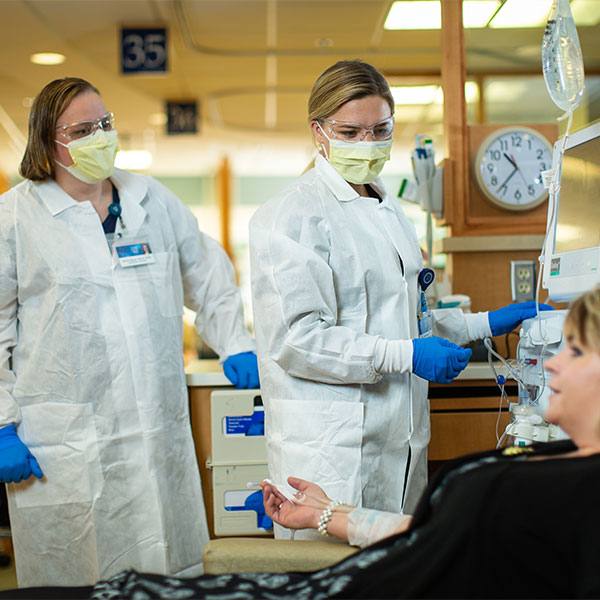-
Biotherapeutics
Studying cells and gels to regenerate spinal disks

Maria Astudillo Potes' life changed instantly when her grandfather fractured his back and suffered paralysis. Determined to turn tragedy into a personal triumph, she now aspires to become a neurosurgeon-scientist who researches and develops new biotherapeutics for spinal disk injuries.
The native of Ecuador moved to the U.S. as a high school student with a dream of becoming a physician-scientist. During college, she learned about regenerative biotherapeutics education at Mayo Clinic and became intrigued by its emphasis on rehabilitating health.
Astudillo Potes is now a student in the M.D./Ph.D. program at Mayo Clinic Alix School of Medicine and Mayo Clinic Graduate School of Biomedical Sciences. Her research focuses on improvements to spine surgery and spinal disk health. She is also probing ways to restore the structural integrity of a patient's spine after injuries or degenerative conditions.
"When a person’s spine becomes unstable due to a vertebral fracture or degenerative condition, it doesn't just impact one person. In my grandfather's case, it affected the whole family. Each of us stepped into new roles to help him," says Astudillo Potes. "My drive is to help patients restore their spine health, whether it involves fusing a vertebral fracture or repairing a degenerative disk to relieve pain, restore function and prevent impairment in their daily lives.”
Mayo Clinic's Center for Regenerative Biotherapeutics supports efforts to train a new generation of physicians and scientists about the latest cell and gene therapies. One of the center's objectives is to train the future workforce with a focus on regenerative biomanufacturing to deliver promising new technologies to patients.
Seeking a new approach to degenerative disk problems
Damage to the rubberlike pads between the bones in the spine, known as intervertebral disks, does not heal or regenerate on its own. Aging or injury can trigger disk degeneration in the form of ruptures, tears or protrusions. Millions of people in the U.S. suffer back pain from disk problems, and it often affects their quality of life. People with degenerative disk disease may experience severe back pain, stiffness, mobility problems and collapse of the vertebrae. Paralysis can occur in extreme cases.
Lichun Lu, Ph.D., a biomedical engineer, scientist and director of the Mayo Clinic Biomaterials and Regenerative Medicine Laboratory, is guiding Astudillo Potes' research into regenerative therapies for spinal intervertebral disks. Dr. Lu's team is studying how large molecules band together to help bones and connective tissue, such as spinal disks, regenerate.
Their preclinical research is probing whether mesenchymal stem cells encapsulated in a biotherapeutic hydrogel could deliver healing messages to torn or ruptured spinal disks. Mesenchymal stem cells are adult stem cells with growth factors that have shown potential for repairing damaged tissue. Hydrogels are similar to natural living tissue and may be used for drug delivery.
"In preclinical research, we are studying cells encapsulated in a gelatin-based biomaterial that are delivered to damaged spinal disks and then documenting the results," says Astudillo Potes.
Dr Lu's team is currently applying this research in animal models. They hope to answer the scientific question of whether encapsulating cells in a hydrogel could deliver healing to exact tissues that need repair.
"Greater understanding of stem cells and hydrogels is important to finding new biotherapeutics that address the underlying cause of disk degeneration," says Dr. Lu. "This basic research may help our team compile data on whether stem cells, along with bioactive molecules, delivered through hydrogels provide long-term improvement compared to surgery."
Aspiring to provide new options for care
Existing therapies for people with spinal disk damage ease the symptoms but do not provide a cure. Standard treatment is surgery to fuse two vertebrae together. That procedure sometimes requires implantation of rods and screws and can cause side effects such as irritated nerves.
Astudillo Potes dreams not only of advancing new ways of improving spinal surgery but also of finding ways to identify which patients are most likely to benefit from regenerative biotherapies. More research is needed.
###
Related stories:
Mayo Clinic Minute: When spine surgery is the answer
Mayo Clinic Q and A: Back pain







